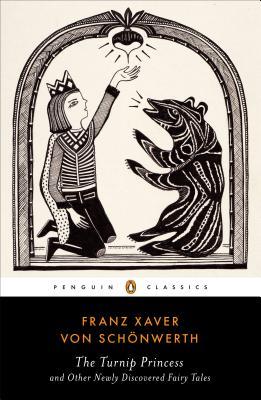The title is really getting too long as it is, but to be clear, the full title of this book is, The Turnip Princess and other newly discovered fairy tales edited by Franz Xaver von Schonwerth, Edited with a Foreword by Erika Eichenseer, Translated with an Introduction and Commentary by Maria Tatar and Illustrated by Engelbert Suss.
As you probably know, I really love fairy tales. So how can I resist requesting a book that has the subtitle "and other newly discovered fairy tales"? What I found out from the introduction was that these fairytales are collected by Franz Xaver von Schonwerth, and are basically tales from the region of Upper Palatinate, or the easter part of Bavaria. The fairy tales in this book are categorised into five categories - "Tales of Magic", "Enchanted Animals", "Otherworldly creatures", "Legends", "Tall tales and Anecdotes", and "Tales about Nature."
To be honest, while I was reading the first section of the book ("Tales of Magic"), I did not feel that these fairytales were very original. Perhaps it was because of the first few stories, which were basically fairly well-known stories, but with boys as the protagonists/heroes instead of girls. Can't say I was impressed with that, but to be fair, I grew up reading the girl heroines and probably have been identifying with them in some way, so to turn the gender roles around was a shock.
From the second part ("Enchanted Animals") onwards though, I started noticing more stories that I haven't discovered before, and a lot more interesting girl heroines. I particularly like the section "Otherworldy creatures", especially the tales of mermaids, because apart from The Little Mermaid, I don't remember reading much mermaid tales. I wasn't very fond of the second last section though ("Tall Tales and Anecdotes") though, but that's because one story, Orferla, is about a schoolteacher who kills an old woman and becomes rich from it, with no apparent punishment. It would be fun to imagine an ending for him though (that murder and desecration of the body of someone you knew has to weigh on a normal person's conscience, right?). The last section, about nature, reminded me of Aesop's Fables, but without an overt moral. But then again, it's safe to say that many, if not most, of these stories do not have an overt moral.
At the end of the book, there is a short explanation/analysis of each fairy tale. It's about thirty pages long in total, so don't expect in-depth things. It's a good jumping point to thinking about the stories that interest you though.
Overall, this is an interesting book. While there are parts that I did not quite enjoy, I can see myself re-reading this again to compare it with the other fairy-tales (I'd like to compare it with Jack Zipe's new translation of the 1st Edition of the Brothers Grimm, which is also fairy dark, to see how it stands).
Disclaimer: I got a free copy of this book from the publisher via NetGalley in exchange for a free and honest review.
Tuesday, March 17, 2015
The Turnip Princess by Franz Xaver von Schonwerth
Labels:
fairy-tales
,
fiction
,
NetGalley
,
western
Subscribe to:
Post Comments
(
Atom
)


No comments :
Post a Comment
I really do appreciate all comments, and I'll try my best to reply within 24 hours!
^_^